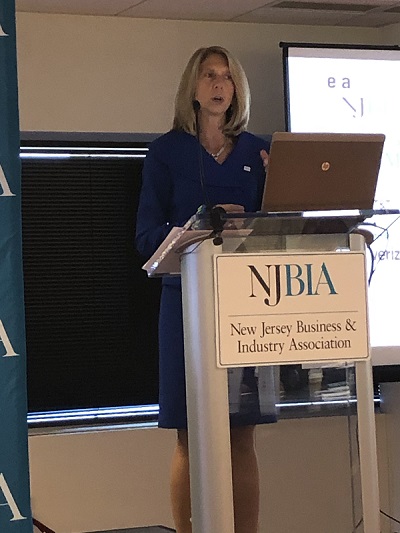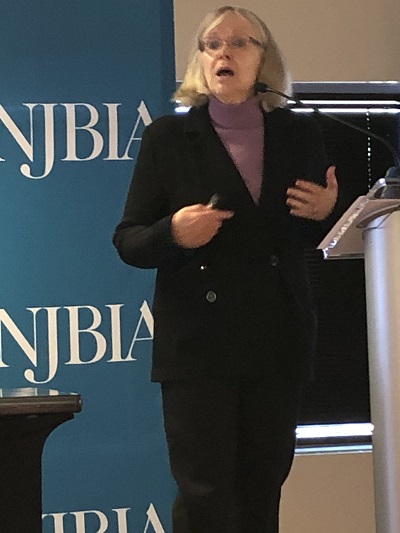NJ in Better Shape than Neighboring States Re: Automation’s Impact on Jobs, Says Speaker at Einstein’s Alley/NJBIA Event
At a recent panel discussion on the future of work in the Garden State, educators, government officials and business executives focused on the implications of technology’s impact on jobs, and on how New Jersey workers will acquire the technical expertise and problem-solving skills they’ll need to meet the demands of a rapidly shifting workplace.
The October 23 talk, held in an audience-packed room at the Crowne Plaza Princeton Hotel and Conference Center, in Plainsboro, was hosted by the New Jersey Business & Industry Association (Trenton) and Einstein’s Alley (Plainsboro), the latter a nonprofit economic development initiative.
The keynote speaker Jane Oates, president of WorkingNation (Los Angeles), an organization founded to create more awareness of the nation’s changing economy. She told the audience there is a widespread misconception that only blue-collar and entry-level jobs will fall victim to automation.
“There are many middle-class, white collar jobs” that are destined to vanish in the ongoing tech revolution, she said.
That gloomy prediction was echoed by a study from consulting firm Forrester (Cambridge, Mass.) that found that 16 percent of all U.S. jobs will be eliminated by automation by the middle of the next decade, with white-collar positions being the hardest hit.
The replacement of humans with machines has already exacted a substantial toll on the white-collar workforce in recent years. According to Katherine Kish, Einstein’s Alley executive director, more than 225,000 administrative positions in the U.S. were abolished between 2012 and 2017 because of technological advances, and that trend shows no signs of slowing down.
To prepare for the future, Oates and the other speakers warned, workers in New Jersey and elsewhere must become more technologically savvy, a defensive move needed to avoid the consequences of machines replacing humans in jobs that require little or no technical skill.
But while it’s inevitable that machines will continue to have a considerable impact on the labor market, Oates pointed out that the same technology also will create new jobs for human workers, such as those requiring the know-how to build and maintain these machines.
NJ Less Vulnerable Job Loss from Automation
In fact, New Jersey may be in better shape than some of its neighboring states when it comes to automation’s impact on jobs.
According to Oates, the diverse nature of New Jersey’s economy—including financial, healthcare and other fields—makes it less vulnerable to automation-related job losses.
One of the reasons why the Garden State’s employment picture, both tech and nontech, has lately started to look rosier is that more of the state’s businesses are participating in apprenticeship programs. Robert Asaro-Angelo, commissioner of the New Jersey Department of Labor and Workforce Development, said there has been a 40 percent increase in the state’s apprenticeship programs over the past 19 months.
By contrast, Oates noted that New York’s economy may take a beating because an estimated one-quarter of its economy is dependent on the high-risk retail sector, which has had scores of brick-and-mortar store closings nationwide as more people shop online.

But New Jersey still faces the vexing problem of how to convince the younger generation to live and work in the state, which has become notoriously expensive. New Jersey needs to deal with the “issues of attractability and affordability” if it wants to curb the ongoing exodus of 18- to 34-year-olds, said Michele Siekerka, NJBIA’s president and CEO.
The state’s tech sector is trying to hire new workers, but its efforts are complicated by the fact that a shortage of people with technical skills has New Jersey and out-of-state companies battling each other for talent. “Poaching in the tech industry is massive,” said Jennifer Velez, executive vice president, community and behavioral health, at RWJBarnabas Health (West Orange).
Joel Bloom, president of NJIT, confirmed Velez’s point that companies are aggressively recruiting the state’s tech workers. He added that newly minted NJIT graduates typically receive two or three job offers with hefty pay packages.
Bloom also noted that “an extreme shortage” of technology workers exists in the country as a whole, citing one published report that said the U.S. has fewer than half of the 1.3 million STEM employees that are needed annually.

Speakers Give Advice on How New Jersey Can Compete in the Technology Arms Race
So, what’s being done to better prepare U.S. workers to meet the challenges of the digital economy?
Aziz Ahmad, CEO of UTC Associates, a New York-based software firm, said that his company offered training programs to its 600 employees that provided instruction in new technical fields, such as data science and cybersecurity.
As a result, according to Ahmad, the company saw an increase in employee morale and productivity. UTC also gave its employees the opportunity to work remotely, which led to the company reducing its need for office space.
Eric Hoversen, general manager of food-processing firm Comarco Products (Camden) and president of the New Jersey Food Processors Association (Moorestown), said that while most Comarco employees are involved in labor-intensive jobs, the company has been identifying employees who have a mix of technical and problem-solving abilities that will be needed as its business grows more complex.
Jason Robinson, director of marketing at Atlanta-based UPS, one of the largest delivery-package and supply-chain-management companies in the world, said that the company had outgrown its tradition of promoting from within the organization, especially for IT positions.
This policy change has led the company to work with the state’s colleges and universities to find the talent it requires to fill IT and other highly skilled jobs, said Robinson, who started working with UPS as a teenager.
UPS, which has an estimated 22,000 of its 440,000 global workforce based in the New Jersey/New York region, has made it a top priority to hire more employees in order to help minimize the impact of those workers who have retired or will soon do so. “It’s extremely important to backfill that experience,” said Robinson.
Fred Sickels, general manager of FASickels Environmental Management (Pennington), agreed that it’s important for companies to actively recruit younger workers to replace an aging workforce.
An estimated 30 to 50 percent of workers in the water supply and treatment industry are expected to retire within the next few years, creating a significant gap in skills and experience that younger workers don’t yet possess. “When they leave, that [knowledge] has to be transferred to someone else,” Sickels said.
All of the panel members agreed that a greater emphasis must be placed on training workers in the skills needed to compete in a technology-driven society. But they noted that there is still a need for nontechnical college graduates who possess critical-thinking skills that are essential for problem-solving.
“We need people who have the aptitude to learn these [technical] skills,” Sickels said. “But we also need people who can think quickly on their feet.”




